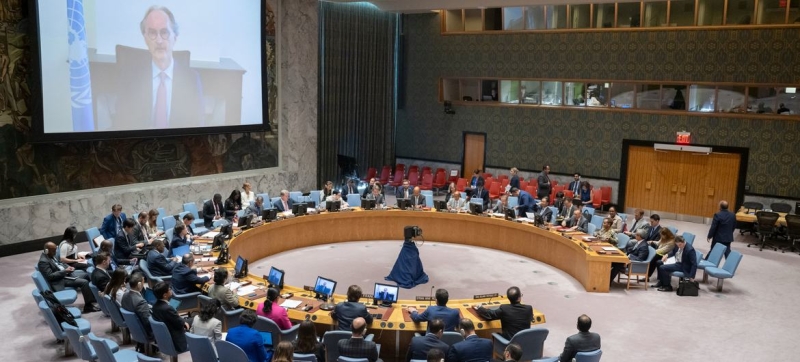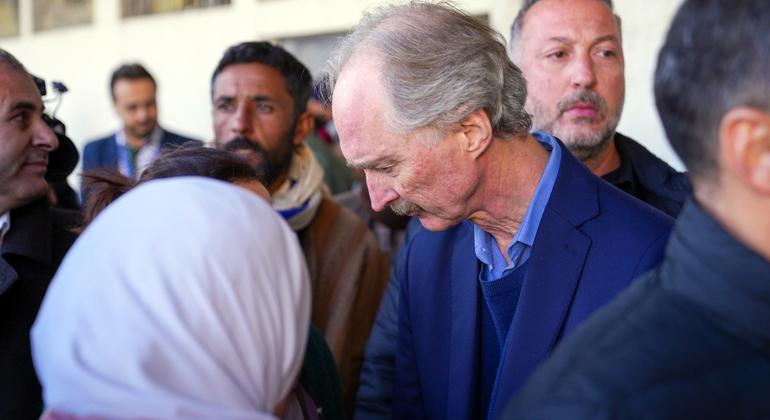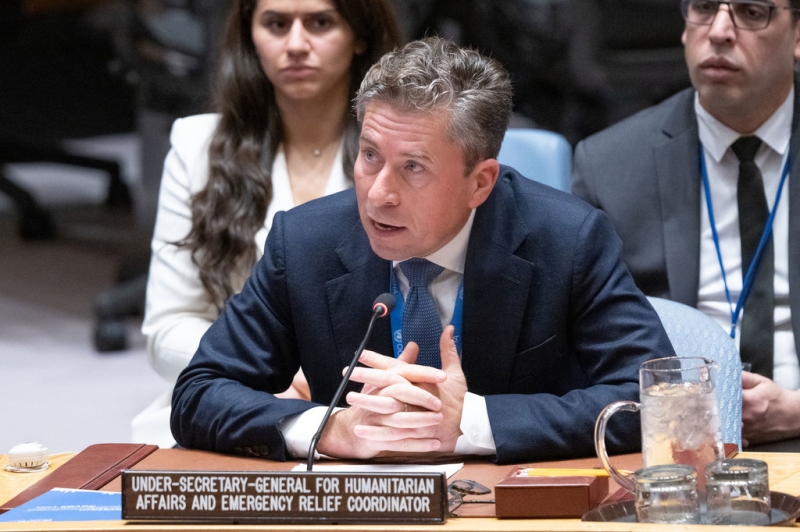
Special Envoy for Syria Geir Pedersen (on screen) addressed the UN Security Council from Damascus. UN Security Council discusses situation in Syria: “The conflict is not over yet” Peace and Security
UN Special Envoy for Syria Geir Pedersen addressed the UN Security Council today from Damascus, his first visit since taking up his post. In his remarks, Pedersen drew attention to the historic moment Syria is experiencing following the fall of a regime that had ruled for more than half a century, and outlined the opportunities that are emerging and the risks that remain.
“Hopes and Fears”
Pedersen noted that “the new reality in Syria belongs to the Syrians themselves” and expressed hope that “the country has a chance to move towards peace, economic stability and justice.” However, he stressed that many Syrians are worried about the future: “Unless the necessary measures are taken – both by the Syrians and the international community – the situation could deteriorate again.”
Situation in Syria
According to the Special Rapporteur, an interim leadership has come to power in Damascus, appointed by the Military Operations Command, the dominant armed coalition in Syria, led by Hayat Tahrir al-Sham and its commander Ahmed al-Sharaa. The interim government currently consists of ministers from the Syrian National Salvation Government, which has de facto ruled Idlib for several years, under the leadership of Prime Minister Mohammed al-Bashir.
At the same time, armed opposition groups that do not obey military command operations continue to operate, such as parts of the Syrian National Army, most of which operates under the auspices of the opposition Syrian National Coalition.
In addition, the northeast of the country, as well as some areas of the city of Aleppo, remain under the control of the US-backed Syrian Democratic Forces (SDF). In these regions, active hostilities continued for the past two weeks, until Turkey and the US reached an agreement on a ceasefire in the Euphrates River area. “The five days of the ceasefire have ended. I am seriously concerned about reports of an escalation of hostilities. This will lead to a catastrophe,” Pedersen emphasized.
The Golan Heights and Israeli Forces
In addition, a new situation is developing in the southwest of the country, Pedersen noted. The UN Disengagement Observer Mission continues to record the presence of Israeli forces and equipment at several locations in the separation zone and at one point in the zone of limitation near the Bravo Line. There are media reports of Israeli troops advancing several kilometers into Syrian territory. Israel has carried out more than 350 strikes on military installations, equipment, and warehouses across Syria since the fall of the previous regime, and these strikes continue – including a recent large-scale attack in Tartus. Such actions, Pedersen believes, put civilians at further risk and undermine the prospects for an orderly political transition.
In addition, according to him, there were reports about the Israeli cabinet’s plans to expand settlements in the Golan Heights. “Israel must immediately cease all settlement activity in the occupied Syrian Golan Heights, as it is illegal. Attacks on Syria’s sovereignty and territorial integrity must be stopped,” the UN Special Envoy emphasized.
Three Main Problems
He identified three main problems that Syria must overcome: the ongoing conflict, economic difficulties, and political transition. The conflict is not over yet, Peredsen stressed.
The economic situation also remains critical: “90 percent of Syrians live in poverty,” he said, calling on the international community to support the Syrians, including measures aimed at economic development and targeted easing of sanctions.
In the political context, the UN envoy stressed the need for a “comprehensive and inclusive transition process,” noting: “Syrians have made enormous sacrifices to earn their right to a future.”
The Path to Political Transition
Pedersen outlined the key steps for a successful transition: preserving state institutions, inclusive participation in the political process by all sectors of Syrian society, a new constitution, and holding free and fair elections. He stressed: “Syrians have made clear their desire for an inclusive process that enjoys public trust.”

Justice and Memory
Pedersen paid special attention to issues of justice and reconciliation, talking about his visit to Sednaya prison: “I saw with my own eyes the torture and execution chambers – evidence of the cruelty of the previous regime towards its people.” He spoke about meetings with surviving prisoners and their families: “One woman, recently released, told me that what she wants most is for justice to prevail.”
The Special Envoy stressed that it is important today to preserve evidence of crimes and ensure the search for missing persons, adding that “without this, Syria will not be able to heal.”
“Time to Act”
Pedersen concluded by calling on Syrians to seize the moment. “Syria belongs to all Syrians. Syrians must step up now, unite and build their future on strong, inclusive foundations,” he stressed.
Escalation has worsened the humanitarian situation
Also speaking from Damascus via video link, UN Emergency Relief Coordinator Tom Fletcher briefed the Council on the humanitarian situation. He recalled that Syria has been experiencing one of the world’s largest humanitarian crises for many years, with 17 million people – more than 70 percent of the population – in need of assistance.

Under-Secretary-General for Humanitarian Affairs and Emergency Relief Coordinator Tom Fletcher. Photo from the archive
More than seven million people are internally displaced, and millions more have been living as refugees in other countries for many years. Almost 13 million Syrians are facing acute food shortages.
Fletcher said the recent escalation had exacerbated those needs, with more than a million people displaced and hundreds killed or injured, including 80 children, in less than two weeks. “It is vital that our humanitarian response matches the new realities that continue to evolve,” he said.
The new government, he said, was committed to scaling up humanitarian action. Fletcher explained that his visit to Syria had three key objectives: ensuring coordination of aid efforts, creating optimal conditions for humanitarian action, and engaging with stakeholders.
While in Damascus, he met with representatives of the new interim government, including the new administration’s commander, Ahmed al-Sharaa, and Prime Minister Mohammed al-Bashir. “I am encouraged by these discussions and pleased to report that they have committed to a major increase in vital humanitarian support,” Fletcher said. “We have received assurances that they will facilitate the movement of humanitarian personnel and supplies from neighbouring countries, including Turkey, Lebanon, Jordan and Iraq, for as long as there is need.”
He called on the international community to increase funding for aid operations in Syria, noting that this year’s humanitarian appeal for Syria – the largest in the world – has not received the attention it deserves. The UN Central Emergency Response Fund has already allocated $32 million for operations in Syria.
